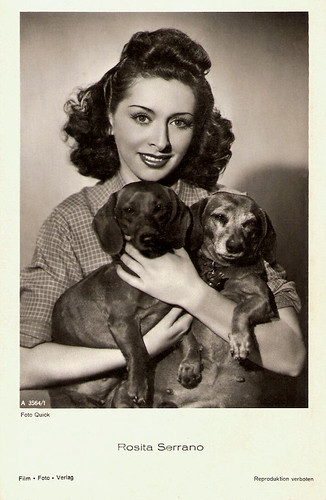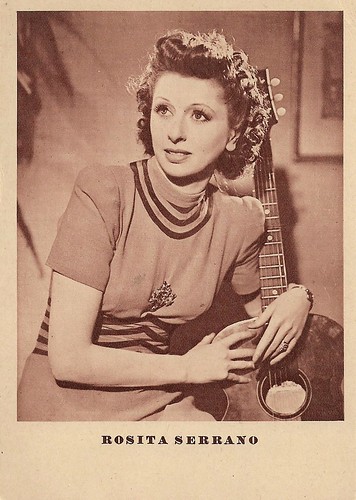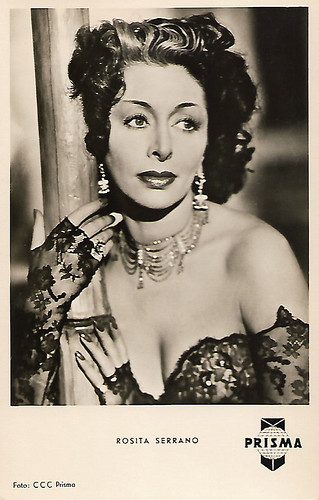Chilean singer and actress Rosita Serrano (1914–1997) had her biggest success in Nazi Germany. Her nickname was the 'Chilenische Nachtigall' (Chilean Nightingale), although her most popular song was 'La Paloma' (The Dove).

German postcard by Film-Foto-Verlag, no. G 133. Photo: Quick.

German postcard by Film-Foto-Verlag, no. A 2245/1, 1939-1940. Photo: Quick / Ufa.

German postcard by Ross Verlag, no. A 3157/1, 1941-1944. Photo: Bankhardt.
Rosita Serrano was born María Martha Esther Alduante (or Aldunate) del Campo in Viña del Mar, Chile in 1914. She was the daughter of diplomat Héctor Alduante (or Aldunate) and opera singer Sofía del Campo.
In the early 1930s, she and her mother moved to Europe. Initially they lived in Portugal and France but by 1936 they moved to Berlin. Serrano had her first success at the Metropol Theater, where she performed a part in the operetta 'Maske in Blau' (Blue Mask). Next she performed Chilean folk songs in another legendary Berlin theatre, Wintergarten.
During that time she was discovered by German composer Peter Kreuder who managed that she got a contract at the German record company Telefunken. From then on she performed in the German language. Her hits included 'Roter Mohn' (Red poppy), 'Schön die Musik' (Beautiful Music), 'Küß mich, bitte, bitte, küß mich' (Kiss me, please, please kiss me) and 'Und die Musik spielt dazu' (And the Music plays to it).
Because of her bell-like voice and pitch-perfect whistling the German public gave her the nickname 'Chilenische Nachtigall' (Chilean Nightingale). By 1938 she received roles in the revue films Es leuchten die Sterne/The Stars Shine (Hans H, Zerlett, 1938), Bel Ami (Willi Forst, 1939), Der vierte kommt nicht/The fourth is not coming (Max W. Kimmich, 1939), and Die kluge Schwiegermutter /The Wise Mother in Law (Hans Deppe, 1939) featuring Ida Wüst.
Serrano sang both in German and Spanish and her repertoire varied from folk to pop, including flamenco, rumba, tango and mambo. According to Wikipedia, “her voice style was mainly operatic coloratura soprano with a deep, fast vibrato. She added frequent embellishments such as soaring arpeggiation and melisma. Some songs were recorded with a few words whispered or spoken, and she occasionally emphasized words with a gritty, growling jazz style reminiscent of African-American blues singer Ethel Waters. She was a pitch-perfect whistler in the manner of Bing Crosby.”

German postcard by Film-Foto-Verlag, no. A 3564/1, 1941-1944. Photo: Quick.

German postcard by Film-Foto-Verlag, no. A 3521/1, 1941-1944. Photo: Quick.

German postcard by Film-Foto-Verlag, no. A 3521/2, 1941-1944. Photo: Quick.
Between film shoots, Rosita Serrano went on tour with two dance orchestras - Kurt Hohenberger's and Teddy Stauffer's. Due to the intercession of Joseph Goebbels, she got gigs in the radio show 'Wunschkonzert für die Wehrmacht' (the musical request programme for the Wehrmacht).
In 1940 she recorded the very popular song 'La Paloma', heard throughout Germany. Years later it was used again on the soundtracks of the films Das Boot (Wolfgang Petersen, 1981) and The House of the Spirits (Bille August, 1993). She co-starred with Paul Hörbiger in the comedy Herzensfreud – Herzensleid/Heartfelt joy - heartbreak (Hubert Marischka, 1940).
In 1943 while on tour in Sweden, Serrano was accused by Germany of being a spy — she had donated a benefit performance to Jewish refugees. She travelled to Chile to avoid the arrest. Her songs were subsequently blacklisted in Nazi Germany. Serrano toured in the United States, but her German repertoire was not popular.
She appeared on The Ed Sullivan Show in 1950, but little came of the publicity. In 1951, she went to West Germany to play a Cuban singer in the film Schwarze Augen/Dark Eyes (Géza von Bolváry, 1951) starring Cornell Borchers, and the next year she sang in the film Saison in Salzburg/Season in Saltzburg (Ernst Marischka, 1952). Her record contract with Telefunken was broken after she was whistled away during a Berlin performance.
Another come-back attempt with Kurt Hohenberger in 1957 was only a mediocre success. In the following decades she had some appearances in German TV talk shows. In 1988 there was a German TV documentary on Serrano, Die chilenische Nachtigall (Dietmar Buchmann, Hilde Heim, 1988). In her native Chile, where she spent the last years of her life, the public never forgave her for performing in Nazi Germany. Rosita Serrano died forgotten and in poverty in Santiago in 1997.

Belgian postcard for a cinema in Genk. Photo: Rosita Serrano in Die kluge Schwiegermutter/The Wise Mother in Law (Hans Deppe, 1939).

German postcard by Ross Verlag, no. A 3402/1, 1941-1944. Photo: Bergheimer.

German postcard by Telefunken. Photo: Ufa / Quick.

German postcard by Verlag und Druckerei Erwin Preuss, Dresden-Freital, Serie 1 'Die neue farbige Filmstarkarte', no. 10. Photo: Charlott Serda.

West-German postcard by Kunst und Bild, Berlin, no. A 411. Photo: CCC Prisma. Rosita Serrano in Schwarze Augen/Dark Eyes (Géza von Bolváry, 1951).
Trailer for documentary Die Chilenische Nachtigall (Dietmar Buchmann, Hilde Heim, 1988). Source: Catchil (YouTube).
Sources: May Ell (IMDb), Stephanie D’heil (Steffi-line - German), Thomas Staedeli (Cyranos), Wikipedia and IMDb.
This post was last updated on 18 June 2021.

German postcard by Film-Foto-Verlag, no. G 133. Photo: Quick.

German postcard by Film-Foto-Verlag, no. A 2245/1, 1939-1940. Photo: Quick / Ufa.

German postcard by Ross Verlag, no. A 3157/1, 1941-1944. Photo: Bankhardt.
Bell-like voice and pitch-perfect whistling
Rosita Serrano was born María Martha Esther Alduante (or Aldunate) del Campo in Viña del Mar, Chile in 1914. She was the daughter of diplomat Héctor Alduante (or Aldunate) and opera singer Sofía del Campo.
In the early 1930s, she and her mother moved to Europe. Initially they lived in Portugal and France but by 1936 they moved to Berlin. Serrano had her first success at the Metropol Theater, where she performed a part in the operetta 'Maske in Blau' (Blue Mask). Next she performed Chilean folk songs in another legendary Berlin theatre, Wintergarten.
During that time she was discovered by German composer Peter Kreuder who managed that she got a contract at the German record company Telefunken. From then on she performed in the German language. Her hits included 'Roter Mohn' (Red poppy), 'Schön die Musik' (Beautiful Music), 'Küß mich, bitte, bitte, küß mich' (Kiss me, please, please kiss me) and 'Und die Musik spielt dazu' (And the Music plays to it).
Because of her bell-like voice and pitch-perfect whistling the German public gave her the nickname 'Chilenische Nachtigall' (Chilean Nightingale). By 1938 she received roles in the revue films Es leuchten die Sterne/The Stars Shine (Hans H, Zerlett, 1938), Bel Ami (Willi Forst, 1939), Der vierte kommt nicht/The fourth is not coming (Max W. Kimmich, 1939), and Die kluge Schwiegermutter /The Wise Mother in Law (Hans Deppe, 1939) featuring Ida Wüst.
Serrano sang both in German and Spanish and her repertoire varied from folk to pop, including flamenco, rumba, tango and mambo. According to Wikipedia, “her voice style was mainly operatic coloratura soprano with a deep, fast vibrato. She added frequent embellishments such as soaring arpeggiation and melisma. Some songs were recorded with a few words whispered or spoken, and she occasionally emphasized words with a gritty, growling jazz style reminiscent of African-American blues singer Ethel Waters. She was a pitch-perfect whistler in the manner of Bing Crosby.”

German postcard by Film-Foto-Verlag, no. A 3564/1, 1941-1944. Photo: Quick.

German postcard by Film-Foto-Verlag, no. A 3521/1, 1941-1944. Photo: Quick.

German postcard by Film-Foto-Verlag, no. A 3521/2, 1941-1944. Photo: Quick.
Accused Of Being A Spy
Between film shoots, Rosita Serrano went on tour with two dance orchestras - Kurt Hohenberger's and Teddy Stauffer's. Due to the intercession of Joseph Goebbels, she got gigs in the radio show 'Wunschkonzert für die Wehrmacht' (the musical request programme for the Wehrmacht).
In 1940 she recorded the very popular song 'La Paloma', heard throughout Germany. Years later it was used again on the soundtracks of the films Das Boot (Wolfgang Petersen, 1981) and The House of the Spirits (Bille August, 1993). She co-starred with Paul Hörbiger in the comedy Herzensfreud – Herzensleid/Heartfelt joy - heartbreak (Hubert Marischka, 1940).
In 1943 while on tour in Sweden, Serrano was accused by Germany of being a spy — she had donated a benefit performance to Jewish refugees. She travelled to Chile to avoid the arrest. Her songs were subsequently blacklisted in Nazi Germany. Serrano toured in the United States, but her German repertoire was not popular.
She appeared on The Ed Sullivan Show in 1950, but little came of the publicity. In 1951, she went to West Germany to play a Cuban singer in the film Schwarze Augen/Dark Eyes (Géza von Bolváry, 1951) starring Cornell Borchers, and the next year she sang in the film Saison in Salzburg/Season in Saltzburg (Ernst Marischka, 1952). Her record contract with Telefunken was broken after she was whistled away during a Berlin performance.
Another come-back attempt with Kurt Hohenberger in 1957 was only a mediocre success. In the following decades she had some appearances in German TV talk shows. In 1988 there was a German TV documentary on Serrano, Die chilenische Nachtigall (Dietmar Buchmann, Hilde Heim, 1988). In her native Chile, where she spent the last years of her life, the public never forgave her for performing in Nazi Germany. Rosita Serrano died forgotten and in poverty in Santiago in 1997.

Belgian postcard for a cinema in Genk. Photo: Rosita Serrano in Die kluge Schwiegermutter/The Wise Mother in Law (Hans Deppe, 1939).

German postcard by Ross Verlag, no. A 3402/1, 1941-1944. Photo: Bergheimer.

German postcard by Telefunken. Photo: Ufa / Quick.

German postcard by Verlag und Druckerei Erwin Preuss, Dresden-Freital, Serie 1 'Die neue farbige Filmstarkarte', no. 10. Photo: Charlott Serda.

West-German postcard by Kunst und Bild, Berlin, no. A 411. Photo: CCC Prisma. Rosita Serrano in Schwarze Augen/Dark Eyes (Géza von Bolváry, 1951).
Trailer for documentary Die Chilenische Nachtigall (Dietmar Buchmann, Hilde Heim, 1988). Source: Catchil (YouTube).
Sources: May Ell (IMDb), Stephanie D’heil (Steffi-line - German), Thomas Staedeli (Cyranos), Wikipedia and IMDb.
This post was last updated on 18 June 2021.
No comments:
Post a Comment